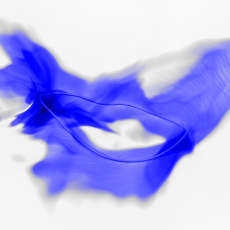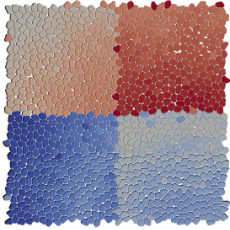Discretizations & Methods
Much of our physical world can be described by mathematics, but only the simplest mathematical equations can be solved with pencil and paper. To take advantage of computers, we must translate mathematical equations into a form that computers can manipulate. At Berkeley Lab, we develop new discretizations to represent complex systems, as well as new methods to solve discretized equations.
Our applied mathematicians work with domain scientists to develop state-of-the-art algorithms and methods for finite volume and discontinuous Galerkin schemes, level set methods and cut cell methods for modeling interfaces, specialized methods for stochastic differential equations, particle and particle-mesh algorithms such as Particle-in-Cell (PIC) and Particle-Particle-Particle-Mesh (PPPM), graph and combinatorial algorithms, discrete event simulation, adaptive mesh refinement and a broad range of approaches for coupling algorithms with different physics at different scales.
Projects
Algoim
Algoim is a collection of high-order accurate numerical methods and C++ algorithms for working with implicitly-defined geometry and level set methods. Contact: Robert Saye (Saye on the Web)
Adaptive Mesh Refinement Frameworks
AMReX and Chombo are software frameworks that support development of applications that use block-structured adaptive mesh refinement. Both support particle and particle-mesh data structures and algorithms as well as calculations in complex geometries using an embedded boundary/cut cell approach. AMReX enables users to use GPU-accelerated hardware based on CUDA, HIP and DPC++. AMReX Contact: Ann Almgren, Chombo Contact: Daniel Martin
Machine Learning Accelerated Models
Our Machine Learning Development Team is using machine learning models within an AMReX framework to accelerate the time-to-solution of computational kernels without reducing accuracy. Contact: Andy Nonaka (Nonaka on the Web)
PFASST (Parallel Full Approximation Scheme in Space and Time)
PFASST is an algorithm designed to provide parallelism in the time direction for the numerical solution of ordinary and partial differential equations. Contact: Xiaoye Sherry Li (Li on the Web)
News

Exascale Application Project Targets Carbon Capture and Storage
Carbon capture and storage technologies are promising approaches for reducing CO2 emissions, but one of the biggest challenges in deploying them is the scale-up from laboratory design to industrial scale. The MFIX-Exa software subproject of the DOE’s Exascale Computing Project is helping achieve that scaling using the AMReX software framework developed at Berkeley Lab. Read More »

Researchers Narrow Down Mass of Sought-After Axion Particle
Researchers at Berkeley Lab and other institutions have narrowed the range of possible masses for the axion, a theoretical particle that may make up much of the dark matter in the universe. Read More »

How AMReX is Influencing the Exascale Landscape
Andrew Myers — a computer systems engineer in Berkeley Lab’s Center for Computational Sciences and Engineering and a member of the AMReX core development team — looks at the influence of the AMReX software framework on a broad spectrum of scientific applications, both within ECP and outside the ECP program. Read More »

Summer Students Use AMReX to Study Cancer Cell Migration
As part of Berkeley Lab's 2021 Computing Sciences Summer Program, a team of undergrads led by senior scientist Ann Almgren got a little closer to understanding how groups of cancer cells may respond to different kinds of forces. Read More »

Harnessing the Power of Exascale for Wind Turbine Simulations
ExaWind, a DOE Exascale Computing Project, is developing new simulation capabilities to more accurately predict the complex flow physics of wind farms, and Berkeley Lab is bringing its adaptive mesh refinement expertise to the project to help make this happen. Read More »







 Instagram
Instagram YouTube
YouTube